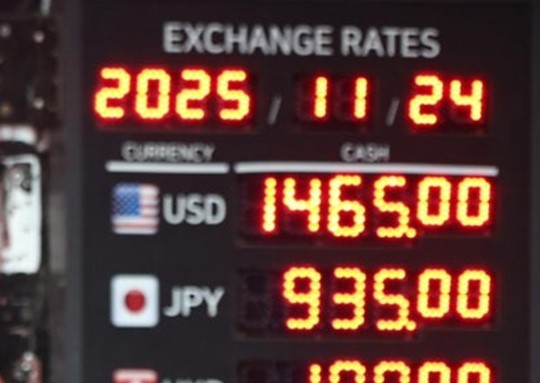Some are concerned the profitability of citizens’ retirement assets could be pushed aside

As the won-dollar exchange rate continues its steep rise, or a decline in the value of the won, the foreign exchange authorities and the National Pension Service have agreed for the first time to create a consultative body to respond to exchange rate issues. This is the first time a “Foreign Exchange Market Four-Party Consultative Body,” including the National Pension Service, has been established. Some are expressing concern that the National Pension Service, which manages citizens’ retirement assets, could be used to stabilize the exchange rate in a way that undermines returns.
After holding their first closed-door meeting on Nov. 24 at the Government Complex Seoul in Jongno District, the Ministry of Economy and Finance, the Ministry of Health and Welfare, the Bank of Korea, and the National Pension Service said, “We formed a four-party consultative body to review the impact on the foreign exchange market from the National Pension Service’s expansion of overseas investment and held the first meeting today.” They added, “Going forward, the four-party consultative body will discuss ways to achieve both the profitability of the National Pension Service and stability in the foreign exchange market.”
This is effectively the first time a four-party consultative body has been formed in relation to the foreign exchange market. During the 1997 International Monetary Fund (IMF) foreign exchange crisis and the 2008 global financial crisis, the government and foreign exchange authorities met to discuss countermeasures, but the creation of such a consultative body is highly unusual.
In December of last year, the National Pension Service raised the ceiling on its foreign exchange swap arrangement with the Bank of Korea from the previous $50 billion (about 73.8 trillion won) to $65 billion. The National Pension Service used this to carry out foreign exchange hedging such as foreign exchange swaps with the Bank of Korea at a time when the won-dollar exchange rate surged due to the declaration of martial law. However, when the won-dollar exchange rate moved into the 1,300-won range around June and July of this year, it reportedly was not using foreign exchange swaps.
The foreign exchange authorities and the National Pension Service appear highly likely to extend their foreign exchange swap agreement. A representative of the four-party consultative body said, “The extension of the foreign exchange swap – whose term ends at the end of the year – is already under discussion at the working level.”
The government believes that the increase in demand for dollars generated in the process of the National Pension Service making large-scale overseas investments is one of the main drivers of the rise in the won-dollar exchange rate. More than half of the National Pension Service’s fund is composed of overseas stocks and bonds, and most of these assets are purchased by converting won into dollars.
Some analysts say the government may reconsider and potentially raise the domestic investment share of the National Pension Service after reviewing its plan to reduce it. As of August of this year, the National Pension Service had allocated 36.8 percent of its total fund to overseas equities. At the end of last year, the target allocation for overseas equities was 33.0 percent, meaning the share has increased by nearly 4 percentage points. The share of domestic equities was 15.4 percent at the end of last year but had declined to 14.8 percent as of the end of August. The National Pension Service has planned to reduce domestic equity allocations by 0.5 percentage points each year through 2029 to manage profitability.
Some are concerned that if the National Pension Service is mobilized as a “relief pitcher” to defend the exchange rate, the profitability of citizens’ retirement assets could be pushed aside. If the overseas investment share is adjusted based not on the most favorable timing for maximizing returns but rather on the needs of exchange rate defense, the profitability of citizens’ retirement assets could suffer. As of August, the National Pension Service’s annual investment return stood at 8.22 percent, more than 1 percentage point higher than the average of 6.98 percent between 2022 and 2024, and that upward trend could be reversed.
Amid these concerns, Health and Welfare Minister Jeong Eun-kyeong, who chairs the fund management committee of the National Pension Service, made the unusual move of discussing the exchange rate during the committee’s meeting on the morning of Nov. 24. Minister Jeong said, “Risks remain, including the instability of the exchange rate and the heightened volatility of domestic and overseas markets, which could act as burdening factors,” adding, “I ask the Fund Management Headquarters to respond swiftly based on careful analysis of the market in order to safeguard both the profitability and stability of the National Pension Service.”
Market participants say the government should examine and address other causes of the rising exchange rate before involving the National Pension Service, whose mission is tied to the public’s retirement security. Park Hyung-jung, an economist at Woori Bank, said, “The National Pension Service exists to secure the retirement funds of citizens, and its founding purpose is not stabilization of the exchange rate,” adding, “There are many other factors driving the rise in the exchange rate, and it is questionable how effective National Pension Service foreign exchange hedging would be.”
Some emphasize that even if the National Pension Service fund is used, it must be handled with great caution. Jung Yong-taek, senior researcher at IBK Investment & Securities, said, “The National Pension Service should not be used in a way that has a major impact on its profitability, and the most appropriate role for this consultative body is to provide a psychological safety net in the market.”


